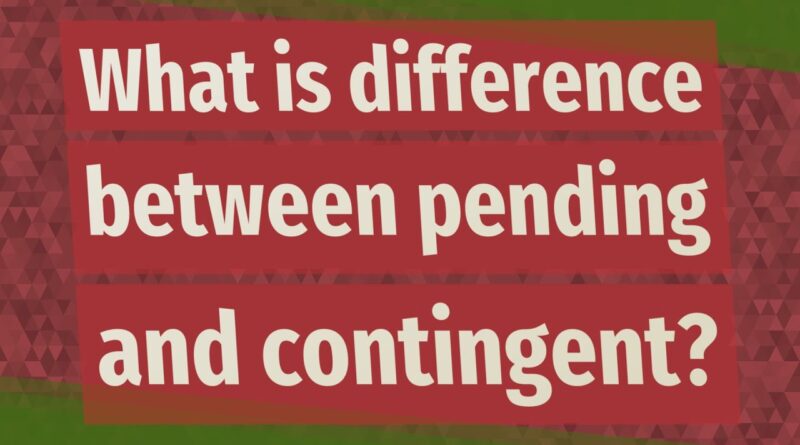What’s the Difference Between Contingent and Pending?
Are you confused about the difference between contingent and pending? You’re not alone. These two terms are often used interchangeably, but they actually have different meanings. Contingent means that an offer has been made on a home, but it is not yet firm. There are usually conditions that must be met in order for the sale to go through. Pending means that an offer has been accepted and the sale is in the process of being finalized. In this blog post, we will explore the differences between these two terms in more detail. We’ll also provide some tips on how to navigate the real estate market if you’re considering making an offer on a home.
You’re ready to buy a house. You find the perfect one and put in an offer. The seller comes back and says your offer is contingent. What does that mean? Contingent offers are not as strong as pending offers, but they are still in the game. A contingent offer means that the buyer’s ability to purchase the property is contingent on something else happening first, such as the sale of their current home. A pending offer is much stronger because it means that all contingencies have been met and the sale is just waiting to go through. In this blog post, we will explore the difference between contingent and pending offers in more detail so that you can be prepared when making an offer on a property.
Are you wondering what the difference is between contingent and pending? If so, you’re not alone. These two terms are often used interchangeably, but they actually have different meanings. A contingent offer is an offer that is not yet binding. This means that the offer may be withdrawn if certain conditions are not met. For example, a contingent offer might be made on a property that is subject to the buyer obtaining financing. Pending, on the other hand, means that an offer has been accepted and is in the process of being finalized. Once an offer is pending, it is usually binding. That means that if you back out of a pending sale, you may be subject to legal penalties. So, when you’re making an offer on a property, be sure to ask your agent whether the offer is contingent or pending. And if you’re not sure what term you should use, just ask!
What is a contingent offer?
A contingent offer is an agreement between a buyer and a seller in which the sale of a property is contingent upon the completion of a specific event. The most common type of contingency is financing, whereby the sale is only finalized if the buyer secures adequate financing. Other contingencies can include inspections, appraisals, and repairs.
When you make an offer on a home, the seller has three days to accept, decline, or present a counteroffer. If the seller accepts your offer, the home is considered pending. If the seller presents a counteroffer or doesn’t respond within three days, the offer is considered contingent.
A contingent offer is when you agree to purchase a home subject to certain conditions being met. These conditions are typically related to financing or the sale of your current home. For example, you might make a contingent offer on a new home with the condition that your current home must sell first. This means that if your current home doesn’t sell within a certain timeframe, usually 30-60 days, you’re not obligated to purchase the new home.
If you have a contingency in your offer, be prepared to explain it to the seller and their agent. They will want to know why you have this contingency and how likely it is that it will be met. Be honest and realistic in your explanation so that they can decide if they’re willing to work with you.
A contingent offer is an offer to purchase a property that is contingent upon the fulfillment of certain conditions. Common contingencies include the buyer obtaining financing, the buyer selling their current home, or the completion of renovations or repairs. If any of the contingencies are not met, the buyer is not obligated to purchase the property.
What is a pending offer?
If you’re in the process of buying a home, you may come across the terms “contingent” and “pending.” Both terms indicate that an offer has been made on a property, but there are some key differences between the two.
A contingent offer means that the sale is contingent on certain conditions being met. For example, the sale may be contingent on the buyer securing financing or the completion of inspections. If one of these contingencies is not met, the sale may not go through.
A pending offer, on the other hand, means that all contingencies have been met and the sale is just waiting to close. In most cases, a property will go from contingent to pending once all inspections have been completed and financing has been secured.
What are the key differences between the two?
The key difference between the two is that “contingent” means that a contract has been signed by both parties and is awaiting fulfillment of the conditions, while “pending” means that a contract has not yet been signed.
How to make a strong offer on a home
When you find a home you want to make an offer on, it’s important to be aware of the different types of offers that exist. A strong offer is one that is likely to be accepted by the seller. There are a few key things to keep in mind when making a strong offer on a home:
– The purchase price should be fair and in line with comparable homes in the area.
– The down payment should be sizeable. A larger down payment indicates a greater commitment from the buyer and will make the offer more appealing to the seller.
– The contingencies included in the contract should be reasonable. Contingencies protect the buyer in case certain conditions are not met, but too many can make an offer seem less attractive.
– The financing should be lined up in advance. This shows the seller that the buyer is serious and has the ability to follow through on the purchase.
If you keep these things in mind when making an offer on a home, you’ll be in a good position to get your offer accepted.
Conclusion
To sum it up, “contingent” means that the sale of a property is contingent on something else happening first, while “pending” means that the sale is in the process of being finalized. Both terms are used in real estate, and it’s important to understand the difference between them so that you can make informed decisions about buying or selling a property.




